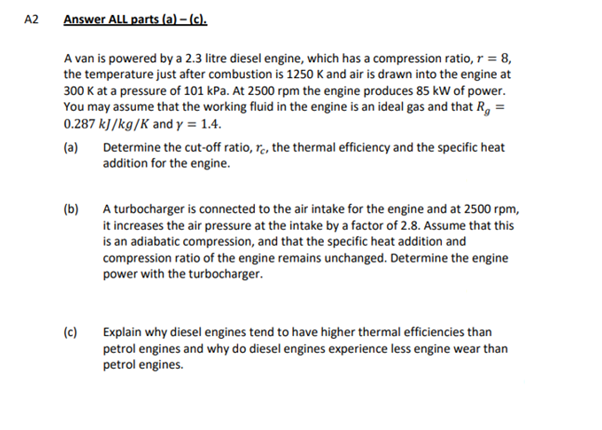A van is powered by a 2.3 litre diesel engine, which has a compression ratio, r = 8, the temperature just after combustion is 1250 K and air is drawn into the engine at 300 K at a pressure of 101 kPa. At 2500 rpm the engine produces 85 kW of power. You may assume that the working fluid in the engine is an ideal gas and that R, = 0.287 kJ/kg/K and y = 1.4. (a) Determine the cut-off ratio, re, the thermal efficiency and the specific heat addition for the engine. (b) A turbocharger is connected to the air intake for the engine and at 2500 rpm, it increases the air pressure at the intake by a factor of 2.8. Assume that this is an adiabatic compression, and that the specific heat addition and (c) compression ratio of the engine remains unchanged. Determine the engine power with the turbocharger. Explain why diesel engines tend to have higher thermal efficiencies than petrol engines and why do diesel engines experience less engine wear than petrol engines.
A van is powered by a 2.3 litre diesel engine, which has a compression ratio, r = 8, the temperature just after combustion is 1250 K and air is drawn into the engine at 300 K at a pressure of 101 kPa. At 2500 rpm the engine produces 85 kW of power. You may assume that the working fluid in the engine is an ideal gas and that R, = 0.287 kJ/kg/K and y = 1.4. (a) Determine the cut-off ratio, re, the thermal efficiency and the specific heat addition for the engine. (b) A turbocharger is connected to the air intake for the engine and at 2500 rpm, it increases the air pressure at the intake by a factor of 2.8. Assume that this is an adiabatic compression, and that the specific heat addition and (c) compression ratio of the engine remains unchanged. Determine the engine power with the turbocharger. Explain why diesel engines tend to have higher thermal efficiencies than petrol engines and why do diesel engines experience less engine wear than petrol engines.
Elements Of Electromagnetics
7th Edition
ISBN:9780190698614
Author:Sadiku, Matthew N. O.
Publisher:Sadiku, Matthew N. O.
ChapterMA: Math Assessment
Section: Chapter Questions
Problem 1.1MA
Related questions
Question
first 2 parts please

Transcribed Image Text:A2
Answer ALL parts (a)-(c).
A van is powered by a 2.3 litre diesel engine, which has a compression ratio, r = 8,
the temperature just after combustion is 1250 K and air is drawn into the engine at
300 K at a pressure of 101 kPa. At 2500 rpm the engine produces 85 kW of power.
You may assume that the working fluid in the engine is an ideal gas and that R, =
0.287 kJ/kg/K and y = 1.4.
(a)
Determine the cut-off ratio, re, the thermal efficiency and the specific heat
addition for the engine.
(b)
A turbocharger is connected to the air intake for the engine and at 2500 rpm,
it increases the air pressure at the intake by a factor of 2.8. Assume that this
is an adiabatic compression, and that the specific heat addition and
compression ratio of the engine remains unchanged. Determine the engine
power with the turbocharger.
(c)
Explain why diesel engines tend to have higher thermal efficiencies than
petrol engines and why do diesel engines experience less engine wear than
petrol engines.
Expert Solution
This question has been solved!
Explore an expertly crafted, step-by-step solution for a thorough understanding of key concepts.
This is a popular solution!
Trending now
This is a popular solution!
Step by step
Solved in 4 steps with 7 images

Recommended textbooks for you

Elements Of Electromagnetics
Mechanical Engineering
ISBN:
9780190698614
Author:
Sadiku, Matthew N. O.
Publisher:
Oxford University Press

Mechanics of Materials (10th Edition)
Mechanical Engineering
ISBN:
9780134319650
Author:
Russell C. Hibbeler
Publisher:
PEARSON

Thermodynamics: An Engineering Approach
Mechanical Engineering
ISBN:
9781259822674
Author:
Yunus A. Cengel Dr., Michael A. Boles
Publisher:
McGraw-Hill Education

Elements Of Electromagnetics
Mechanical Engineering
ISBN:
9780190698614
Author:
Sadiku, Matthew N. O.
Publisher:
Oxford University Press

Mechanics of Materials (10th Edition)
Mechanical Engineering
ISBN:
9780134319650
Author:
Russell C. Hibbeler
Publisher:
PEARSON

Thermodynamics: An Engineering Approach
Mechanical Engineering
ISBN:
9781259822674
Author:
Yunus A. Cengel Dr., Michael A. Boles
Publisher:
McGraw-Hill Education

Control Systems Engineering
Mechanical Engineering
ISBN:
9781118170519
Author:
Norman S. Nise
Publisher:
WILEY

Mechanics of Materials (MindTap Course List)
Mechanical Engineering
ISBN:
9781337093347
Author:
Barry J. Goodno, James M. Gere
Publisher:
Cengage Learning

Engineering Mechanics: Statics
Mechanical Engineering
ISBN:
9781118807330
Author:
James L. Meriam, L. G. Kraige, J. N. Bolton
Publisher:
WILEY